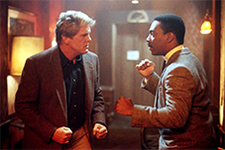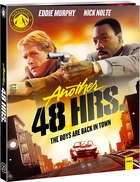Another 48 Hrs. [Blu-Ray]
|

In a recent interview, director Walter Hill inadvertently explains the fundamental problem with Another 48 Hrs.. In reminiscing about his initial response to the idea of making a sequel to 48 Hrs., his 1982 hit that helped to establish the parameters of the '80s action-comedy buddy movie and launched Eddie Murphy to big-screen stardom, he says, "I certainly felt very mixed about it. I remember thinking, ‘Maybe I should let this one go by' … except I didn't want anybody else to do it. I didn't know if I wanted to do it, but I sure as hell didn't want to read in the paper that somebody else was directing it." Hill's willingness to helm the film only to keep someone else from doing it is evident in virtually every frame. It looks good—slick and polished in a way that the rougher, more engaging 48 Hrs. was not—but it also feels rote, by the numbers, a cash-in. Not surprisingly, the project was initiated by Murphy, who was riding a career high (his previous six movies had all opened number one at the box office), but was perhaps feeling a twinge of mortality with the critical and commercial disappointment of Harlem Nights (1989), which he wrote and directed as well as starred in the previous year. The film once again teams Murph's Reggie Hammond, a sharply dressed, fast-talking convict, with rumpled, gruff police detective Jack Cates (Nick Nolte). In the first movie, Jack was able to get Reggie out of prison for the titular two days because he had information that could help them catch a murderous escaped convict with whom Reggie used to work. Another 48 Hrs. takes place five years later, with Reggie finally getting out of the slammer after serving an additional sentence for allegedly stealing the prison's payroll. Once again Reggie has connections with some bad guys that are also connected to the first film's villain, and Jack needs his help not only to nab them, but also to clear his name because he is under investigation by internal affairs. Reggie, who thinks that Jack double-crossed him, is an unwilling partner, but formula dictates that they eventually bury their differences and work together—and that is precisely what happens. As in the first film, Murphy and Nolte have good, odd-couple chemistry, although the sequel lacks the potent rawness of the original's racial tensions. Jack wasn't just a gruff white cop, but a genuine racist, which made the film's signature scene in which Reggie commandeers a bar full of rednecks by posing as a cop all the funnier and more engaging. Jack has been softened this time around, and he and Reggie work out their aggressions by literally hitting each other and claiming that now they're "even." In the first film they didn't know other; in this one, they hate each other. Distrust and been replaced by animosity, and it doesn't work nearly as well. The screenplay by John Fasano, Jeb Stuart, and Larry Gross (from a story idea by Murphy, credited as Fred Braughton) primarily works as a series of riffs on scenes and ideas from the first movie, which makes it feel like the cinematic equivalent of a cover song. The desert-set opening shoot-out is just a different iteration of the first film's desolate chain-gang breakout, and you know that at some point Reggie is going to find himself in a bar full of rednecks in need of his wit and attitude to put them in their place. The bad guys are a generic assortment of long-haired, leather- and sunglasses-clad motorcycle punks who are in the service of a mysterious drug runner known only as "The Iceman," which gives everyone something to talk about, but isn't interesting enough for us to care about. The plot mechanics are sometimes awkward and unwieldy, which is most likely due to the film having been severely cut in postproduction by more than 50 minutes (Hill allegedly cut his original 145-minute workprint down to 120 minutes, which was then further slashed by the studio to 93 minutes). This does not mean that Another 48 Hrs. is lacking in any pleasure, as Murphy and Nolte make their scenes work even when they shouldn't. Hill, the director of The Warriors (1979), Streets of Fire (1984), and Extreme Prejudice (1987), knows how to stage violence, and there are some genuinely enthralling action scenes, including an attack on Reggie's prison bus that sends the vehicle flipping end over end on a barren desert highway. Hill has a strong sense of humor, and he infuses some of the biggest setpieces with an amusing flair, although he is also prone to allowing things to devolve into simple mayhem, which is what best describes the climactic gunfight in a well-appointed nightclub—lots of bullets, shattered glass, and confusion. And the fact that it climaxes with a virtual repeat of the first film's climax, with Reggie being held by the bad guy and Jack having a High Noon moment with a twist, simply seals the deal that Another 48 Hrs. lacks anything smacking of originality or daring and is instead more than content to simply dish up what we've already had.
Copyright © 2021 James Kendrick Thoughts? E-mail James Kendrick All images copyright © Paramount Home Entertainment | |||||||||||||||||||||||||||||
Overall Rating:



 (3.5)
(3.5)
Subscribe and Follow
Get a daily dose of Africa Leader news through our daily email, its complimentary and keeps you fully up to date with world and business news as well.
News RELEASES
Publish news of your business, community or sports group, personnel appointments, major event and more by submitting a news release to Africa Leader.
More Information
